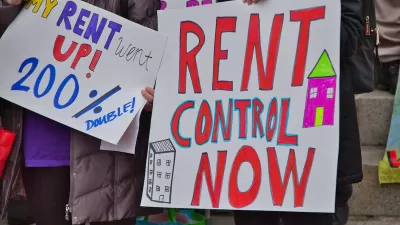Rent control policies, widely panned by economists, have been shown to slow displacement and keep housing affordable.

For decades, rent control policies have earned the ire of economists, who argue that rent control is bad “because rent control is a price control, and price controls artificially distort well-functioning markets, resulting in a mismatch between supply and demand and the creation of the dreaded deadweight loss triangle all budding economist learn about.”
But, Mark Paul asks in The American Prospect, why should renters not be afforded the same privilege as more than half of Americans—namely, those who “enjoy de facto rent control in the form of the 30-year mortgage”?
Paul writes that there’s a problem with the traditional thinking about rent control in economist circles: it doesn’t hold up. “As recent empirical work has shown, the neoclassical account’s core assumptions—one, that rent control restricts the supply of new housing; and two, that it misallocates existing housing, thereby causing an irrecoverable collective loss—fail to hold when it comes to the real world.” Paul explains that “abundant evidence” shows that rent control does not constrain housing supply, and there is no housing boom when rent control laws are repealed.
Rent control can also slow the tide of gentrification and displacement when neighborhoods grow in popularity and value. “It helps turn housing from a nexus of profit to one of community, family, and social space.” Moreover, rent control has broad popular support. “Polling conducted in 2019 by Data for Progress found that a majority of likely voters, including a majority of independents, support rent control, with just 1 in 5 opposing such a measure.”
It’s also a matter of equity: “Homeowners, who skew white and rich, benefit tremendously from the government’s rules, regulations, and subsidies that allow them to pay a fixed monthly sum for housing over 30 years. It’s high time for the government to extend these benefits—and the economic security that comes with them—by adopting rent control to cover all people in the United States.”
FULL STORY: Economists Hate Rent Control. Here’s Why They’re Wrong.

Maui's Vacation Rental Debate Turns Ugly
Verbal attacks, misinformation campaigns and fistfights plague a high-stakes debate to convert thousands of vacation rentals into long-term housing.

Planetizen Federal Action Tracker
A weekly monitor of how Trump’s orders and actions are impacting planners and planning in America.

Chicago’s Ghost Rails
Just beneath the surface of the modern city lie the remnants of its expansive early 20th-century streetcar system.

Bend, Oregon Zoning Reforms Prioritize Small-Scale Housing
The city altered its zoning code to allow multi-family housing and eliminated parking mandates citywide.

Amtrak Cutting Jobs, Funding to High-Speed Rail
The agency plans to cut 10 percent of its workforce and has confirmed it will not fund new high-speed rail projects.

LA Denies Basic Services to Unhoused Residents
The city has repeatedly failed to respond to requests for trash pickup at encampment sites, and eliminated a program that provided mobile showers and toilets.
Urban Design for Planners 1: Software Tools
This six-course series explores essential urban design concepts using open source software and equips planners with the tools they need to participate fully in the urban design process.
Planning for Universal Design
Learn the tools for implementing Universal Design in planning regulations.
planning NEXT
Appalachian Highlands Housing Partners
Mpact (founded as Rail~Volution)
City of Camden Redevelopment Agency
City of Astoria
City of Portland
City of Laramie





























